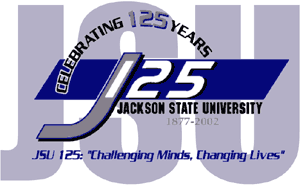|

Jackson State University
College of Education and Human Development
The University
Jackson State University, located in Jackson, Mississippi, is a historically black coeducational, research intensive, public institution of higher learning that has been designated by the Board of Trustees of State Institutions of Higher Learning as the urban institution of Mississippi.
The University functions as a community of learners in which teaching, research, and service are central to its total learning environment. The University maintains a commitment to serve students effectively from diverse academic, social, economic, ethnic and geographic backgrounds. The University also utilizes its human, cultural, and physical resources to enhance the surrounding metropolitan community.
The College of Education and Human Development
The College of Education is divided into two schools, the School of Instructional Leadership and the School of Administrative Leadership. It’s primary responsibility is the preparation of professional educators and support personnel who are caring, competent and qualified. This mission is accomplished through the development, implementation, administration, and evaluation of programs in teacher education and other professional areas that support the teaching profession and the mission of the University. The College provides comprehensive, career-oriented programs that attract diverse students into teacher education and related fields such as educational leadership, school, community and rehabilitation counseling, early childhood and elementary education, special education and health and physical education.
NCATE accreditated, the College prepares responsive professionals who are dedicated to excellence in learning and leadership and are committed to educational excellence for students who represent diversity in race, culture, gender, age, ability, religion, socio-economic status, exceptionalities, language, and geographic areas. There are more than sixty-five faculty and staff employed in the College. More than 85 percent of the full-time teaching faculty hold terminal degrees.
Students enjoy a variety of options for participation in university-wide, College and departmental organizations. The organizations sponsored through the College with an emphasis on education are the Student National Education Association (SNEA), Health, Physical Education and Recreation Club (HPER Club), Student Council for Exceptional Children (SCEC), Potential and Optimistic Worker for Educational Reform (P.O.W.E.R), and Kappa Delta Pi.
Undergraduate Program Options
The College of Education offers a variety of programs leading to the Bachelor of Science and Bachelor of Science in Education Degrees. The programs are nationally recognized by Speciality Professional Associations (SPA).
Degree programs leading to teacher certification include:
- Elementary Education (K-4 and 4-8)
- Special Education
- Social Science Education
- Health, Physical Education, and Recreation (with concentrations in Health or Physical Education)
- Secondary Education
- Music
- English
- Mathematics
Other programs that lead to the Bachelor of Science Degree but not to teacher certification include:
- Child Care and Family Education
- Educational Technology
- Ethnic Studies
- Recreation Administration
- Therapeutic Recreation
Graduate Program Options
The College of Education offers graduate programs in School, Community and Rehabilitation Counseling (Masters and Specialists Degrees), Early Childhood Education (Masters, Specialists and Doctorate), Elementary Education (Masters and Specialists), Special Education (Masters and Specialists), Education Leadership (Masters, Specialists, and Doctorate), and in Health, Physical Education and Recreation (Masters and Specialist). We also offer a Masters of Arts in Teaching (MAT) degree for alternate route certification.
Duration
Undergraduate programs are designed as four year programs. Masters and specialist degree programs are thirty-six semester hour programs; and doctoral programs vary depending upon the professional goals, concentrations and design of candidates’ programs.
Certification
Programs leading to certification include:
- Elementary Education (K-4 and 4-8)
- Special Education
- Social Science Education
- Health, Physical Education, and Recreation (with concentrations in Health or Physical Education)
- Secondary Education
- Music
- English
- Mathematics
Questions and answers
1. What are the requirements for admission to undergraduate Teacher Education?
- Demonstrate a grade point average of 2.50 or higher;
- Complete 44 hours of the core curriculum;
- Submit official recommendation forms;
- Provide evidence of the required test scores;
- Reflect a composite score of 21 on the ACT, with no subtest scores below 18, or Praxis I Area Examination with minimum scores of: Reading 170, Writing 172, and Math 169, or A combined score of 860 on the SAT; and
- Successfully complete an interview and writing sample assessment.
2. Who do interested individuals contact for additional information regarding programs in the College of Education?
Contact one of the following:
- Dr. Ronald Mason, President
Jackson State University
Jackson, MS 39217
(601) 979-2323
- Dr. Joseph Stevenson, Provost and Vice President for Academic Affairs
Jackson State University
Jackson, MS 39217
(601) 979-2244
- Dr. Ivory Phillips, Dean
College of Education and Human Development
Jackson State University
Jackson, MS 39217
(601) 979-2433
- Dr. Vivian Taylor, Associate Dean
School of Instructional Leadership
Jackson State University
Jackson, MS 39217
(601) 979-2226
Email
- Dr. Walter Crockett, Associate Dean
School of Administrative Leadership
Jackson State University
Jackson, MS 39217
(601) 979-2345
Web Site: www.jsums.edu
|